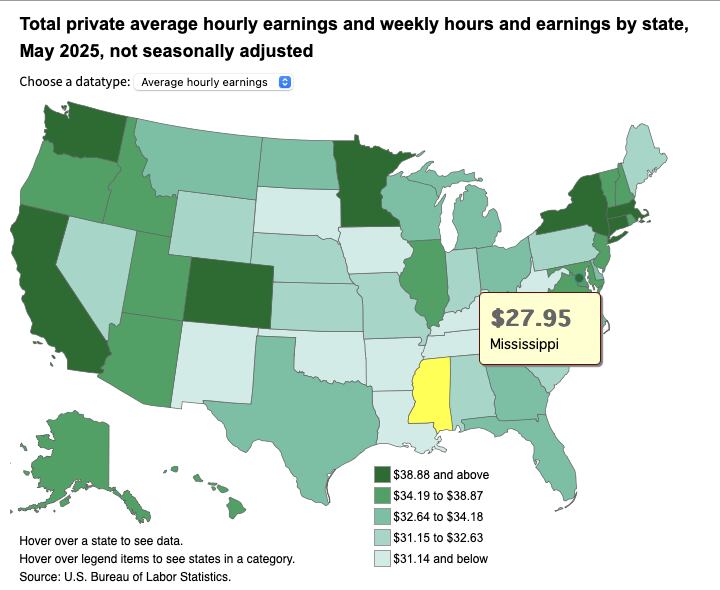Mississippi Aims to Reverse Brain Drain with Jobs and Education Boost

MISSISSIPPI — For many young adults, Mississippi represents a crossroads of opportunity and challenge. While some find comfort in the state's affordability, sense of community, and quieter pace of life, others feel compelled to leave in search of better wages, broader career prospects, and more diverse cultural experiences.
Take Stephanie Rodriguez, for instance. A nursing student at the University of Southern Mississippi, she sees value in staying put. Despite higher hourly pay rates in other states, she argues that Mississippi offers a better balance between income and cost of living. “The gap between what you earn and what you spend on housing, food, and safety is more favorable here,” she explains. Beyond economics, Rodriguez appreciates the safety and quality of life in her hometown of Brandon, which she says compares favorably to parts of Georgia where she previously lived.
On the other hand, Gunnar Hamm felt Mississippi didn’t offer enough professional pathways to match his ambitions in the music industry. After moving from Lamar County to attend Middle Tennessee State University, he found the mentorship, networking opportunities, and hands-on experience he had been missing back home. He believes Mississippi could do more to cultivate creative industries by providing students with real-world projects and exposure to potential careers.
“We need programs that connect students directly with opportunities,” Hamm said. “If people saw even a glimmer of a future here, they’d stay.”
The Brain Drain Dilemma
Mississippi has long struggled with a phenomenon known as "brain drain," wherein educated, skilled workers leave the state seeking better economic prospects elsewhere. According to the U.S. Bureau of Labor Statistics, the average hourly wage in Mississippi is $27.95 — significantly lower than neighboring states like Alabama ($31.15), Louisiana ($29.53), and Tennessee ($30.81). Compounding the issue is the federal and state minimum wage, which has remained stagnant at $7.25 since 2009. A recent proposal to raise it to $10.50 by 2026 failed to gain traction in the legislature.
Low wages are just one piece of the puzzle. Many young professionals also cite limited access to industry networks, fewer job options, and outdated perceptions about the state’s culture as reasons to move away.
Erica Jones, executive director of the Mississippi Association of Educators, notes that low pay and lack of support are pushing newly certified teachers out of the state. “As salaries increase, so does the cost of health insurance,” she said, highlighting the financial strain on educators.
Yet not all who leave do so solely for money. Hamm, for example, was drawn to Tennessee by the vibrant campus environment and professional connections available there. He hopes to return one day to start his own production company, offering opportunities to Mississippi students that he himself never had.
Why Some Choose to Stay
Despite these challenges, many residents remain committed to building lives in Mississippi. Affordable housing ranks high among the state’s attractions. According to Construction Coverage, Mississippi is the 14th most stable housing market in the country, with only a 10% drop in prices since 2000 — a sign of resilience and long-term stability.
Jones, a Jackson resident, finds the state ideal for raising a family. “You can actually afford to buy a home on an educator’s salary here,” she said.
Additionally, Mississippi ranks well for safety. In 2023, it placed 16th for low crime overall and 13th when measured by total crimes per 100,000 people. For many families, this makes the state an attractive place to settle down.
Efforts to Reverse the Trend
Recognizing the urgency of retaining talent, Mississippi is investing heavily in workforce development and education reform. AccelerateMS, the state’s workforce office, is working closely with employers to align training programs with current labor needs. Blaise King, director of workforce innovation, explained that the goal is to ensure that once trained, individuals can find employment close to home.
Incentives such as housing assistance, relocation stipends, and student loan relief are being offered to early-career teachers and other professionals to encourage them to stay or return.
The Academic Common Market, a program allowing students to pay in-state tuition for out-of-state programs not offered in Mississippi, has helped students like Hamm pursue specialized degrees. However, he believes the state should expand its offerings to reduce the need for students to leave altogether.
Jones emphasizes that staying isn't just a personal choice — it's a civic responsibility. “When we lose educators and skilled workers, our communities suffer,” she said. “We’re losing people who could make a difference right here.”
Looking Ahead
Mississippi’s future depends on its ability to evolve. Emerging fields like advanced manufacturing, healthcare, electrical construction, HVAC, plumbing, and even artificial intelligence are opening new doors. AccelerateMS is actively reaching out to former residents who have left, hoping to entice them back with new opportunities.
According to Results for America, quality jobs lead to better outcomes for both individuals and businesses, increasing employee engagement and reducing turnover costs.
King encourages young people to explore growing sectors: “We want to ensure individuals receive the right training and support so they can build lasting careers — not just float from job to job.”
While the road ahead is steep, Mississippi is making strides to become a place where young talent can thrive — and perhaps, eventually, return.
Post a Comment for "Mississippi Aims to Reverse Brain Drain with Jobs and Education Boost"
Post a Comment